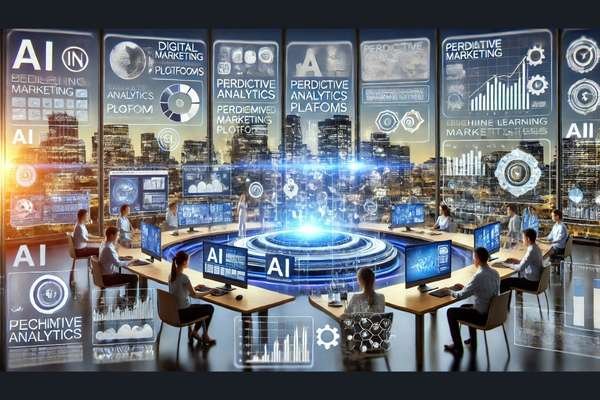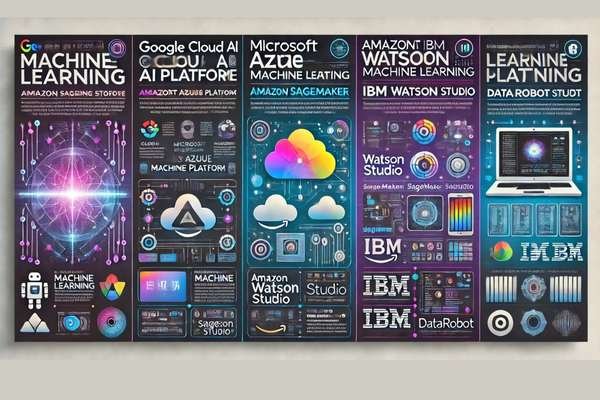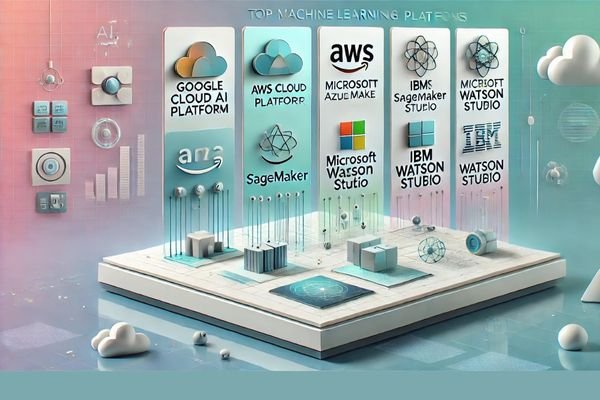
Mastering AI for a Powerful Content Strategy
September 25, 2024
Understanding Machine Learning : What It Is and How It Powers Modern Technology
September 25, 2024The Future of Machine Learning Platforms : Trends and Predictions
As we stand on the brink of a technological revolution, machine learning platforms are driving significant changes across various industries. From personalizing marketing strategies to automating mundane tasks, these platforms are indispensable tools for modern businesses. This article delves into the emerging trends and future predictions for machine learning platforms, offering insights for digital marketers, developers, and content creators alike.
Table of Contents
1. Current Trends in Machine Learning Platforms
1.1 Rise of Automated Machine Learning (AutoML)
Automated machine learning (AutoML) is increasingly sought for since it facilitates the building of machine learning models. AutoML helps to efficiently employ machine learning by automating difficult tasks like feature engineering and hyperparameter tweaking, therefore enabling non-experts. The democratization of artificial intelligence technologies aims to let more professionals include machine learning into their activities.
1.2 Integration with Internet of Things (IoT)
Combining IoT devices with machine learning algorithms is driving increasingly intelligent environments. By means of data analysis across linked devices, companies might streamline procedures and enhance customer experiences. Predictive maintenance enabled by machine learning, for instance, can greatly reduce industrial downtime.
1.3 Enhanced Personalization in Digital Marketing
Machine learning systems are transforming digital marketing by allowing hyper-personalization. These systems examine vast volumes of consumer data in order to give tailored content, offers, and experiences. Using these realizations can help digital marketers greatly increase engagement and conversion rates.
2. Predictions for the Future of Machine Learning Platforms
2.1 Expansion of Edge Computing
Edge computing is about to become a necessary part of systems supporting machine learning. By running data closer to its source, edge computing reduces latency and enhances real-time decision-making. For uses like driverless cars and smart cities that call for quick reactions, this trend will be very helpful.
2.2 Advancements in Natural Language Processing (NLP)
Natural language processing (NLP) will continue to develop and enable ever more complex interactions between people and machines. Machine learning systems will probably have advanced NLP tools, improved customer service automation, voice-activated assistants, and sentiment analysis among other things.
2.3 Growth of Explainable AI (XAI)
Transparency and responsibility become more sought for as artificial intelligence systems explode. By improving the interpretability of AI systems, explainable artificial intelligence (XAI) seeks to let users understand the decision-making procedures. In sectors like banking and healthcare, where decisions have to show openness, this will be crucial.
3. Impact on Digital Marketing, Development, and Content Creation
3.1 Revamping Digital Marketing Plans
Platforms for machine learning let companies use predictive analytics, maximize ad spending, and improve client segmentation. Forecasting consumer behavior helps businesses create relevant and timely advertising that increase ROI.
3.2 Transposing Software Development
Machine learning systems give developers tools to create clever applications with little effort. These sites cut the requirement for great coding knowledge by offering pre-trained models and APIs. This allows developers to concentrate on creativity and produce effectively solving for difficult challenges apps.
3.3 Improving Generation of Content
Machine learning lets content creators simplify production lines. From automated editing tools to content recommendations, machine learning systems can increase production and inventiveness. AI-driven systems, for instance, might propose best headlines or spot hot subjects, therefore guaranteeing that material stays interesting and current.
3.4 Including Affordable Products
Including affiliate items into machine learning systems lets companies properly profit from their internet presence. Platforms like Amazon SageMaker, for example, provide tools and resources that, via affiliate marketing, could be promoted. Promoting pertinent affiliate products helps companies make commissions and benefit their customers.
The Future of Machine Learning Platforms : Trends and Predictions, Recap
Future Trends and Predictions for Machine Learning Platforms
| Trend/Feature | Description | Impact |
|---|---|---|
| AutoML | Automates complex tasks like feature engineering and hyperparameter tuning, making ML accessible to non-experts. | Enables faster deployment of ML models and democratizes AI. |
| Edge Computing | Processes data closer to the source, reducing latency and enhancing real-time decision-making. | Essential for real-time applications like autonomous vehicles and IoT devices. |
| Enhanced NLP | Improves natural language understanding for tasks like sentiment analysis, customer service, and voice assistants. | Boosts customer interaction and satisfaction through smarter automation. |
| Explainable AI (XAI) | Focuses on transparency by providing insights into AI decision-making processes. | Crucial for regulated industries like healthcare and finance where accountability is mandatory. |
| Hyper-Personalization | Uses ML to analyze large datasets and deliver tailored customer experiences in real time. | Increases engagement and conversion rates in digital marketing campaigns. |
Frequently Asked Questions
What are machine learning platforms?
Machine learning platforms are software frameworks that provide the tools and libraries necessary to build, deploy, and manage machine learning models. They facilitate data analysis, model training, and prediction generation.
How are machine learning platforms used in digital marketing?
In digital marketing, machine learning platforms are used to analyze consumer data, predict future behaviors, and personalize marketing efforts. They help in segmenting audiences, optimizing ad placements, and enhancing customer engagement.
What is the future of machine learning platforms in content creation?
Machine learning platforms will continue to transform content creation by automating tasks, generating insights, and enhancing creativity. They will enable content creators to deliver more personalized and engaging content efficiently.
Conclusion
Machine learning platforms have great future prospects and provide creative ideas in many different spheres. Digital marketers, developers, and content creators have to keep educated about new trends as these platforms change and use these tools to keep competitive. Accepting developments in machine learning will enable companies to seize fresh prospects and propel notable expansion.
Ultimately, including machine learning platforms into regular corporate activities is not only a trend but also a need. The capacity to maximize these platforms will differentiate the leaders from the followers in the digital terrain as we advance.








